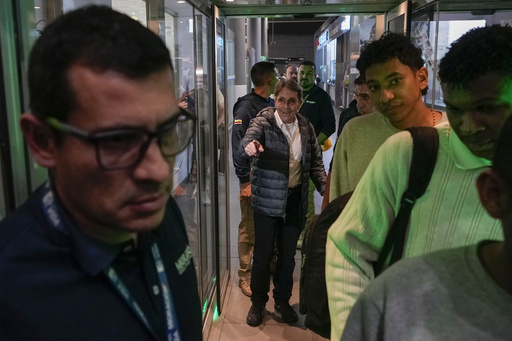
BOGOTÁ, Colombia — A prominent figure in Colombia’s drug trade, Fabio Ochoa, has been deported back to his homeland after spending 25 years in a U.S. prison for drug trafficking offenses. Ochoa, who was a significant player in the infamous Medellin cartel, was released just days ago, leaving a substantial portion of his 30-year sentence behind.
Upon arrival in Bogotá on a deportation flight, he appeared in a simple grey sweatshirt, carrying a plastic bag with his belongings. As he disembarked, immigration officials in bulletproof vests were on hand to process him, with no law enforcement present to arrest him upon his return. Ochoa’s details were logged into the immigration system, confirming he is not sought by Colombian authorities. The immigration agency expressed through a social media platform that the former drug lord was released to reunite with his family.
In an interview with reporters at Bogotá’s El Dorado Airport, Ochoa proclaimed, “I was framed,” when asked if he had any regrets about his past. He smiled while embracing his daughter for the first time in seven years, expressing joy over his reunion and his intentions to return to Medellin to be with his family. “The nightmare is over,” he stated, relishing his newfound freedom at the age of 67.
In the late 1970s and early 1980s, Ochoa and his brothers capitalized on the booming cocaine trade in the United States, garnering immense wealth that led to their inclusion in Forbes Magazine’s list of billionaires by 1987. Residing in Miami, Ochoa managed a distribution hub for the Medellin cartel, which was once led by the notorious Pablo Escobar, killed in 1993 during a confrontation with authorities.
Ochoa’s legal troubles began with an indictment for his alleged involvement in the 1986 murder of Barry Seal, an American pilot for the cartel, who later turned informant for the DEA. In the early 1990s, Ochoa and his brothers surrendered to Colombian authorities in exchange for avoiding extradition to the U.S. They were released from prison in 1996 but Ochoa faced additional arrest for drug-related charges in 1999, leading to his extradition to the U.S. in 2001. He was the sole defendant from a broader indictment who chose to go to trial, ultimately leading to his conviction and a lengthy sentence, while others cooperated with the authorities for lesser penalties.
As Mexican drug traffickers have gradually outshined older figures like Ochoa in the narcotics trade’s public narrative, the former cartel leader has become less prominent in popular culture. Recently, Ochoa was portrayed in Netflix’s series “Griselda,” where he is shown competing against and later teaming up with Griselda Blanco, played by Sofia Vergara, for control of the drug market in Miami. He also features in the series “Narcos,” depicted as the youngest son of an affluent Medellin family with ties to ranching, contrasting sharply with Escobar’s more modest beginnings.
Richard Gregorie, a retired assistant U.S. attorney involved in Ochoa’s prosecution, commented on the situation, indicating that authorities were never able to fully seize the wealth amassed by the Ochoa family through their drug operations. He suggested that Ochoa would likely return home in favorable financial conditions. “He won’t be retiring a poor man, that’s for sure,” Gregorie remarked regarding Ochoa’s prospects upon returning to Colombia.

